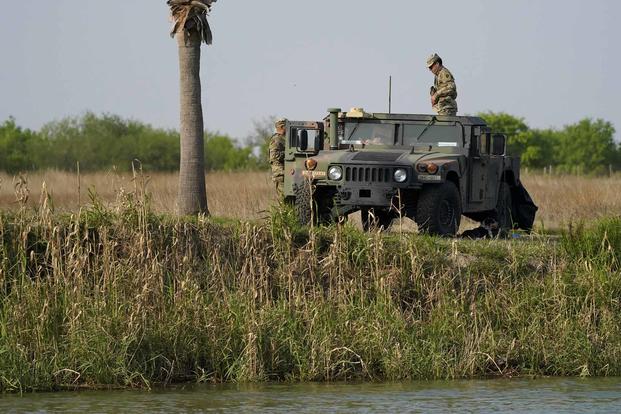A wealthy Republican mega-donor gave South Dakota Gov. Kristi Noem $1 million to cover the estimated cost of deploying National Guard troops to the U.S.-Mexico border, and both the National Guard Bureau and Defense Department are staying silent on whether this sets a precedent that military units are for rent.
"We have no additional information or comment to make on Gov. Noem's decision," Pentagon Press Secretary John Kirby told reporters Friday when asked by Military.com whether a billionaire funding a military mission suggests the National Guard is effectively for hire.
The National Guard Bureau did not respond to multiple requests for comment to Military.com, referring questions to Noem's office.
Read Next: Marine Raider Convicted of Involuntary Manslaughter, Hazing in Green Beret's Death
Willis and Reba Johnson's Foundation -- helmed by billionaire Willis Johnson who lives in Tennessee -- made a $1 million donation directly to the state, according to multiple South Dakota state House members and Senators interviewed by Military.com. Willis regularly makes large contributions to Republicans, including $200,000 to the Trump Victory political action committee.
Johnson declined to be interviewed on the record during multiple phone calls with Military.com.
A wealthy partisan actor financing a military mission has raised questions over potential ethics concerns. Eight South Dakota state legislators interviewed by Military.com said that the deployment could easily be funded from other streams of state money.
Tony Randolph, a Republican who chairs the state's Military and Veterans Affairs Committee, told Military.com that he applauds Noem's move to deploy troops to the border, but Randolph voiced concern about the state accepting the donation.
"There's a lot of unanswered questions," Randolph said. "I don't know why there's a struggle to cover the resources ... It looks weird."
Ten Democrats in the South Dakota Legislature called on Noem to reject the donation in a letter sent to her this week.
Noem's office pointed to two state laws that staff say make the donation legal, 5-24-12 and 33-12-30, which covers gifts to the governor and state.
"I've read the statutes, it's very vague, it's a huge concern of mine. It's sketchy ... I think we're treading pretty loosely here," Democratic State House member Linda Duba, who serves on the South Dakota appropriations committee, told Military.com. "You can give land to the state, you can give money and you're usually doing it for philanthropy. But this is a military mission."
Roughly 50 guardsmen from the state will be sent to the border, according to a South Dakota National Guard spokesman. However, he said the mission is in the early planning stages and there is no specific mission outlined for soldiers yet. It is unclear what unit will be sent.
That's a small figure compared to the 3,800 Guard troops currently on the U.S.-Mexico border. All of those troops are on federal Title 10 orders, according to a United States Northern Command spokesman. That entitles them to full federal benefits, including accrual of retirement points, free health care, GI Bill benefits, VA home loan eligibility and a housing allowance worth up to thousands of dollars a month.
CNN recently reported that troop numbers on the border will go down to 3,000.
Noem plans to send troops on State Active Duty orders, meaning they effectively will be state employees and miss out on some pay bonuses and other benefits, such as GI Bill accrual typically associated with active-duty service. Guardsmen on state orders also aren't eligible for care from the Department of Veterans Affairs if injured on the mission.
It is not unprecedented for private interests to fund National Guard missions, but it was more prevalent in the early days of the United States, when wealthy donors would fund militias to fight the British. They included Robert Morris, who used his fortune and business connections to procure arms and ammunition for the revolutionary cause.
Before the Militia Act of 1903, Guard units often were subsidized by wealthy interests to protect property from union strikes, criminals and Native Americans.
In the early 20th century, "private contributions were so substantial in some states that they constituted the primary source of revenue for those state Guard units," according to a paper published by Georgetown professor Michael Golden.
For some Guard units, this included railroad tycoons in the Industrial Revolution funding military missions to protect construction projects and rail systems in volatile areas.
For a decade, leading to World War I, the Pennsylvania National Guard's "primary funding" came from "private, not government" entities, Golden wrote.
-- Steve Beynon can be reached at Steve.Beynon@military.com. Follow him on Twitter @StevenBeynon.
Related: Democrats Raise Ethical Concerns Over GOP Donor's $1 Million Funding of Border Deployment














